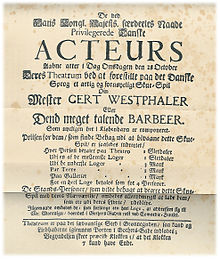| Gert Westphaler | |
|---|---|
 Gert Westphaler poster, the oldest preserved poster for a Holberg play Gert Westphaler poster, the oldest preserved poster for a Holberg play | |
| Written by | Ludvig Holberg |
| Date premiered | 1722 |
| Place premiered | Lille Grønnegade Theatre, Copenhagen, Denmark |
| Original language | Danish |
| Genre | Comedy |
| Setting | Denmark |
Gert Westphaler or The Loquacious Barber (Danish: Mester Gert Westphaler eller Dend meget talende Barbeer) is a satirical play written by the Norwegian-Danish playwright Ludvig Holberg. It premiered in five sets at the Lille Grønnegade Theatre in Copenhagen on 28 October 1722 but Holberg later adapted it into a one- set version.
Reception
Holberg comments on the reception of the play in his first Latin-language memoir from 1728: The Loquacious Barber displeased almost all spectators in the audience to such an extent that quite a few left before it ended, some discretely and secretly, others openly and bluntly. I had expected something else, having always loved this eye-nest of mine among my comedies.
Adaptions
DR has produced a "made for television version" of the play that was first broadcast on 29 March 1976. It was directed by Hans Rosenquist and was starring Stig Hoffmeyer, Ruth Brejnholm, Lisbet Lipschitz]and Ejnar Hans Jensen.
English translations
Further information: List of Holberg's plays in English translation- Holberg, Ludvig (1827). "The Babbling Barber: A Comedy in One Act". The Odd Volume: Second Series. Translated by Corbett, M. London: Longman, Rees, Orme, Brown, and Green. pp. 291–348. OCLC 11855940.
- —— (1950). Seven One-act Plays. Translated by Alexander, Henry. Princeton University Press for the American-Scandinavian Foundation. OCLC 1612009.
References
- "Mester Gert Westphaler". saxo.no (in Norwegian). Retrieved 27 March 2018.
- "Gert Westphaler og den meget talende barber". carlthdreyer.dk (in Norwegian). Retrieved 27 March 2018.
External links
| Ludvig Holberg | |
|---|---|
| Novels | |
| Plays | |
| Based on Holberg's life and work | |
| People |
|
| Related | |
This Denmark-related article is a stub. You can help Misplaced Pages by expanding it. |
This article on a play from the 1720s is a stub. You can help Misplaced Pages by expanding it. |